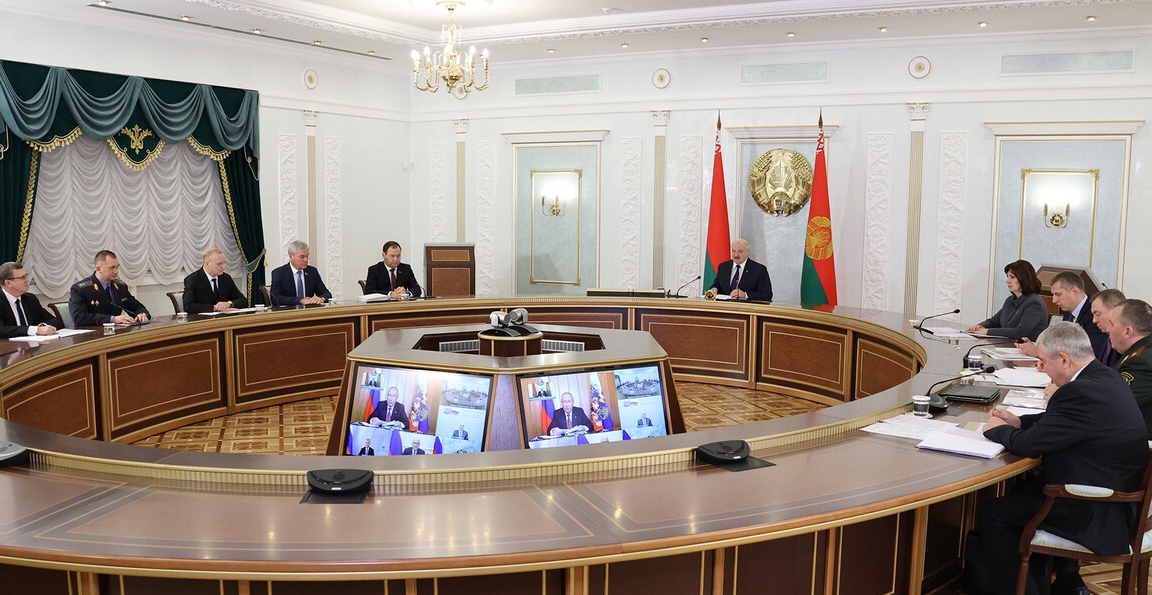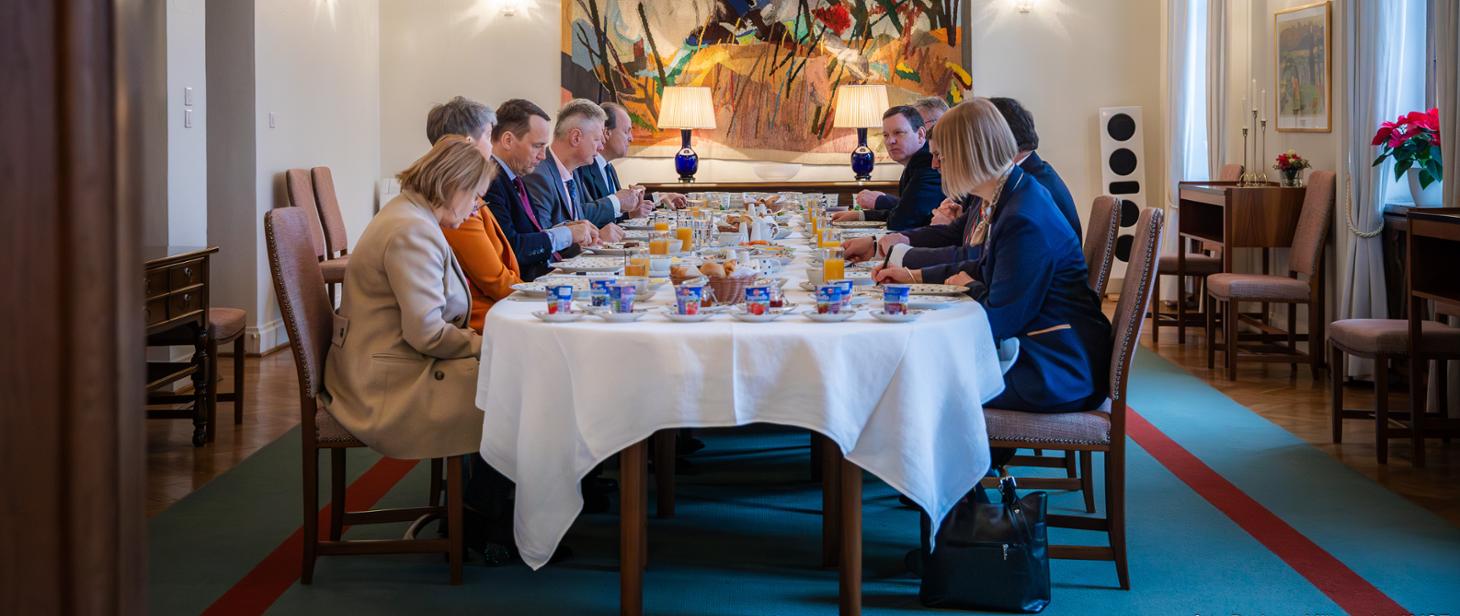
Russia and Belarus Sign a Package of Union State Programs
Russia and Belarus Sign a Package of Union State Programs
On November 4, Belarusian President Alyaksandr Lukashenka signed a package of 28 Union State programs, formerly called “road maps,” for economic integration with Russia. “Clearly spelled out in the Union programs are the formation of joint sectoral markets, the implementation of a harmonized financial, tax, credit, pricing and trade policy, and the mechanisms for the development of a common economic space,” claims the official report (Belta, November 4).
Disregarding the triumphalism of official commentaries (Sb.by, November 5), pundits known for their critical analysis of the Belarusian government have generally disagreed over the significance of the event. Some of them have trivialized it in strikingly similar terms, ideological differences notwithstanding. Thus, independent analyst Artyom Shraibman, a liberal Westernizer (T.me/shraibman, November 4), and Mikhail Malash, a Lukashenka acolyte critical of Russian oligarchic capitalism (Facebook.com/michael.malasch.5, November 5), both claim that the signed documents are replete with vague, non-committal language, although they are important symbols of the further convergence of Russia and Belarus. But other critics, like Warsaw-based Pavel Usov, argue in no uncertain terms that the documents are far-reaching and that Belarus is, therefore, on the verge of losing its sovereignty (Facebook.com/pavel.usov.10, November 5).
Three circumstances added piquancy to the signing procedure. First, it occurred in a virtual format, via videoconference. Second, Russian President Vladimir Putin participated in the event from Sevastopol, Crimea, where he was taking part in celebrations of Russia’s Unity Day. Seizing the opportunity, Lukashenka asked his Russian colleague to convey to the Crimeans the warmest congratulations from the Belarusians and wishes of good health and courage. “They must understand that they are not alone. We are all close and will hold on to each other and help in these difficult times,” Lukashenka said (President.gov, November 4). That gave a pretext to Andrei Savinykh, the chair of the parliamentary Commission on International Affairs, to claim that “both de facto and de jure Crimea was recognized by the Belarusian side as Russian [and that] today it was unambiguously declared.” However, Putin’s press secretary Dmitry Peskov replied that “in Belarus, the parliament does not determine foreign policy” (Sputnik.by, November 4). Like here in Russia, it is a prerogative of the president” (TASS, November 5). Savinykh’s overzealous statement was thus shrugged off. Artyom Shraibman opines that Savinykh, who has long dropped repeated hints about his desire to replace Vladimir Makei as Belarus’s foreign minister, was perhaps looking for an endorsement from Moscow, but this may be too audacious a move in Lukashenka’s eyes (T.me/shraibman/339, November 4). Finally, during the signing ceremony, Putin made a statement to the effect that the cost of Russian natural gas for Belarus is seven to ten times lower than spot prices in Europe and three to four times lower than the price at which Gazprom sells gas to Europe under long-term contracts. “The subtext is transparent,” writes Alexander Klaskovsky, a veteran opposition journalist. “Say thank you and do not ask for more concessions” (Naviny, November 5).
Viewing Moscow as a key player in Belarus has never been an aberration, but now it has become a categorical imperative of sorts. In his interview to Belsat, Yaroslav Shimov, of Radio Liberty and a well-published historian, suggested that the fate of Lukashenka depends not so much on what happens in Belarus, but on what transpires in Russia, whose own political regime seems fairly stable at the moment (YouTube, November 4). In his turn, Klaskovsky sees signs of Russia pushing Lukashenka to fulfil his earlier (September 2020) commitment to yield power, which is why Lukashenka may have to grudgingly accept the position of the All-Belarusian People’s Assembly following the February 2022 constitutional referendum. In any case, finalizing the prerogatives of this not-yet constitutional body and those of its chair is all but the only subject that has been publicly discussed about the new constitution (Kommersant, September 29). Maxim Samorukov of Carnegie.ru believes that the Kremlin’s sole twin tasks in Belarus are to keep change at the helm of power under control and “avoid Lukashenka and the Belarusian ruling elite suddenly […] looking for new allies” (Carnegie.ru, November 6).
Against this backdrop, the Belarusian opposition, especially its segment in exile, is losing all the trappings of unity it had acquired in 2020. Now, each opposition initiative shows signs of being supported by specific Western donors, and those are not necessarily coordinating their activities. The earlier abortive announcement of a national strike by a certain opposition group (see EDM, November 2), for instance, was rather more conditioned by the expectations of its donors than by a gross miscalculation on the part of that group (T.me/shraibman, October 28). The strike announcement notably ran afoul of Svetlana Tikhanovskaya and her entourage in Vilnius. In his turn, Franak Viachorka, an important member of that entourage, declared his commitment to thwart the February 2022 constitutional referendum in Belarus (Svaboda.org, November 4). But how this can be achieved is not clear.
On November 2, a conference put on by the Foreign Policy Council “Ukrainian Prism” took place in Kyiv, titled “Neutrality: A Way Out of the Belarusian Foreign Policy Dilemma?” (Facebook/NewBelarus, November 4). Just as any other topic, neutrality is worth discussing, but the current trend seems to point in the opposite direction. In any case, on November 22, a conference on Belarus, initiated by the Austrian government, will take place in Vienna. According to Viachorka, the idea for it was proposed by Tikhanovskaya as early as last spring. In announcing the planned international conference, Austrian Chancellor Alexander Schallenberg claimed that sanctions cannot be the only language Europe uses in its Belarus policy. According to Tikhanovskaya, the conference will be a “dialogue platform” (Belsat, November 1), and representatives from the Belarusian government were invited as well. But it is unclear whether any officials from Minsk will arrive because, in the undiplomatic words of Viachorka, the Belarusian regime “fears the dialogue as the plague” and its members prefer to “hide in their bunker,” hopeful that this will extend their tenure (Svaboda.org, November 4).
The unavoidable conclusion, thus, remains that while Russia’s sway on Belarus is growing, forces standing in opposition to it have not yet figured out their coordinated or measured response.


